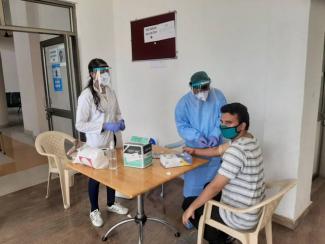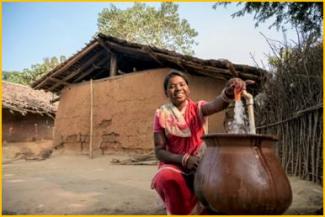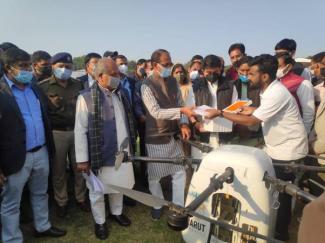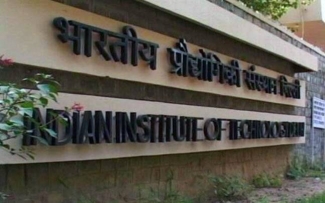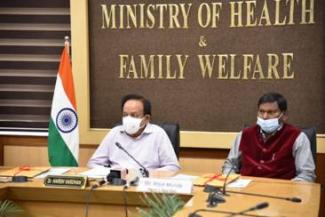
इस समाचार को हिन्दी में पढ़े आगे...
In fulfilment of the cherished goal of a “TB Mukt Bharat” envisioned by Prime Minister Narendra Modi, Dr Harsh Vardhan, Union Minister for Health and Family Welfare today launched the “Tribal TB Initiative” along with Arjun Munda, Union Minister for Tribal Affairs in the presence of Ashwini Kumar Choubey, Minister of State for Health and Family Welfare. A Guidance Note on Joint Action Plan for Tuberculosis (TB) Elimination, a Special Edition of Tribal Ministry’s Publication ‘ALEKH’ on TB, and a document on Tribal Tuberculosis (TB) Initiative was also released at the event.
The Union Health Minister noted the topical need to organize the event. He highlighted that India witnessed over 18.04 lakh TB notifications, notwithstanding the difficulties presented because of the COVID-19 pandemic and its related regulation/preventive strategies. “In spite of all the unforeseen challenges of COVID 19, the Government of India was able to convert all those into opportunities for TB Elimination by introducing bidirectional screening for COVID-19 and TB, strengthening diagnostic networks and combining TB screening in COVID surveillance activities’ he pointed out. Health being a holistic subject influenced by all aspects of life, the necessity to have a multisectoral collaboration with various Ministries and Departments to reach out to the most vulnerable population categories was underscored to achieve the elimination target by 2025.
Dr Harsh Vardhan reiterated that the UT of Lakshadweep and district of Badgam in Jammu & Kashmir have been declared TB Free on World TB Day this year while several other States and Districts across the country have been awarded for their progress made towards achieving the SDGs related to TB. He added that, “This Government accords top priority to ensuring Universal Access to free treatment and care for TB across the country. In India, we have over 10 Cr tribal population living with a huge diversity in their population dynamics. Through constant efforts, our government is able to see developments in their health indicators and overall wellbeing. The government has already increased the Budget allocation for TB in India a four-fold in the last 5 years. High quality drugs, diagnostics, digital initiatives, innovative private sector interventions and community engagement intervention, are all aligned to rapidly decline TB incidence and mortality in the country.”
The Ministers were apprised that over 104 million tribal population lives in India, across 705 tribes, accounting for 8.6 % of the country’s population. 177 tribal districts were identified as high priority districts where physical remoteness, malnutrition, poor living conditions and lack of awareness contribute to the vulnerability of the tribal population to TB. Initially, the activities of the joint plan will be focusing on 161 districts across 18 identified States. They would involve deploying improved vulnerability mapping techniques, organization of sensitization and capacity building workshops for volunteers, periodic TB active case finding drives, provision of TB Preventive Therapy (IPT) to identified vulnerable population and develop long term mechanisms for vulnerability reduction.
The Union Health Minister mentioned that the linking of NIKSHAY Portal of MoHFW and Swasthya Portal of the M/o Tribal Affairs will help boost data compilation on TB and pave way for efficient and convergent actions. He said,“India will be the textbook guidance to the world in TB elimination, if we could achieve this by 2025, even before the global SDG target of 2030.”
Arjun Munda, congratulated both the Ministries on the formulation of the joint plan and observed, “The health problems of the tribal communities need customised solutions. It is heartening to see the joint initiatives of both the Ministries to eliminate TB among the tribal communities of India. I hope that in the coming days, we are able to identify similar diseases which are widespread among the tribal communities, and devise mechanisms to curb their spread.”
Ashwini Kumar Choubey spoke on the all-round initiatives undertaken by the government to ensure Health for all and thanked partner organizations like USAID, BMGF and Piramal Foundation for helping TB Care reach the last person in the remotest parts of the country.
‘टीबी मुक्त भारत’ का लक्ष्य प्राप्त करने के लिए डॉ. हर्षवर्धन ने जनजातीय टीबी पहल लॉन्च की
टीबी उन्मूलन में भारत विश्व के लिए प्रमुख मार्गदर्शक बनेगाः 2025 तक टीबी खत्म करने पर डॉ. हर्षवर्धन
प्रधानमंत्री नरेन्द्र मोदी द्वारा परिकल्पित “टीबी मुक्त भारत” के पोषित लक्ष्य की पूर्ति के लिए केंद्रीय स्वास्थ्य एवं परिवार कल्याण मंत्री डॉ. हर्षवर्धन ने आज केंद्रीय जनजातीय कार्य मंत्री अर्जुन मुंडा के साथ, स्वास्थ्य एवं परिवार कल्याण राज्य मंत्री अश्विनी कुमार चौबे की उपस्थिति में “जनजातीय टीबी पहल” लॉन्च की। कार्यक्रम में क्षयरोग (टीबी) के लिए संयुक्त कार्य योजना पर एक मार्गदर्शक नोट, टीबी पर जनजातीय मंत्रालय के विशेष प्रकाशन ‘आलेख’ और जनजातीय क्षयरोग (टीबी) पहल पर एक दस्तावेज भी जारी किया गया।
केंद्रीय स्वास्थ्य मंत्री ने इस कार्यक्रम के आयोजन की प्रासंगिक आवश्यकता पर बात की। उन्होंने कहा कि कोविड-19 महामारी के कारण आ रही कठिनाइयों और इससे जुड़े विनियम/निवारक रणनीतियों के बावजूद भारत में 18.04 लाख से भी ज्यादा क्षयरोग के मामलों की सूचना मिली। उन्होंने कहा कि कोविड-19 की सभी अप्रत्याशित चुनौतियों के बावजूद, भारत सरकार कोविड-19 और टीबी के लिए द्वीदिशीय स्क्रीनिंग शुरू करके, डायगनोस्टिक नेटवर्क को मजबूत बनाकर और कोविड निरीक्षण गतिविधियों में टीबी स्क्रीनिंग को शामिल करके, उन पस्थितियों को टीबी उन्मूलन के लिए अवसरों में बदलने में सक्षम रही है। स्वास्थ्य को जीवन के सभी पहलुओं से प्रभावित होने वाले समग्र विषय के रूप में देखते हुए, इस कार्यक्रम में 2025 तक उन्मूलन लक्ष्य को प्राप्त करने हेतु सबसे कमजोर आबादी तक पहुंचने के लिए विभिन्न मंत्रालयों और विभागों के बीच बहुक्षेत्रीय सहयोग की आवश्यकता को रेखांकित किया गया।
डॉ. हर्षवर्धन ने दोहराया कि इस वर्ष विश्व टीबी दिवस पर केंद्र शासित प्रदेश लक्षद्वीप और जम्मू और कश्मीर के बडगाम जिले को टीबी मुक्त घोषित कर दिया गया जबकि देश के कई अन्य राज्यों और जिलों को टीबी से जुड़े संधारणीय विकास लक्ष्य (एसडीजी) प्राप्त करने की दिशा में प्रगति करने के लिए सम्मानित किया गया। उन्होंने आगे कहा, “सरकार देशभर में टीबी के निशुल्क ईलाज और देखभाल के लिए यूनिवर्सल एक्सेस सुनिश्चित करने को उच्च प्राथमिकता देती है। भारत में 10 करोड़ से भी ज्यादा की संख्या में जनजातीय आबादी है जिनके बीच काफी विविधताएं हैं। अपने निरंतर प्रयासों से, हमारी सरकार उनके स्वास्थ्य संकेतकों और समग्र कल्याण में विकास देखने में सक्षम है। सरकार भारत में पिछले 5 साल में टीबी के लिए बजट आवंटन चार गुना बढ़ा चुकी है। उच्च गुणवत्ता की दवाएं, नैदानिकी, डिजिटल पहलें, नवाचार से जुड़े निजी क्षेत्र का शामिल होना और सामुदायिक सहभागिता का हस्तक्षेप, ये सभी देश में टीबी के मामलों और मृत्यु दर में तेजी से गिरावट के लिए संरेखित हैं।”
मंत्रियों को बताया गया कि भारत में 104 मिलियन से अधिक जनजातीय आबादी रहती है, जिनमें 705 जनजातियां शामिल हैं और यह देश की 8.6 प्रतिशत जनसंख्या हैं। 177 जनजातीय जिलों को उच्च प्राथमिकता वाले जिलों के रूप में पहचाना गया है जहां दूरी, कुपोषण, जीवन की बद्तर स्थिति और जागरुकता की कमी, टीबी के लिए जनजातीय आबादी को संवेदनशील बनाती है। शुरू में, संयुक्त योजना की गतिविधियां 18 चिन्हित राज्यों के 161 जिलों पर ध्यान केंद्रित करेंगी। वे वहां पर उन्नत संवेदनशीलता मैपिंग तकनीक, स्वच्छता के संगठन और वॉलंटियर्स के लिए क्षमता निर्माण वर्कशॉप का आयोजन करेंगे, समय-समय पर टीबी के सक्रिय केसों की खोज के लिए मुहिम चलाएंगे, संवेदनशील आबादी की पहचान के लिए टीबी प्रिवेंटिव थैरेपी (आईपीटी) के प्रावधान लागू करेंगे और संवेदनशीलता घटाने के लिए दीर्घकालिक तंत्र विकसित करेंगे।
केंद्रीय स्वास्थ्य मंत्री ने कहा कि स्वास्थ्य एवं परिवार कल्याण मंत्रालय के निक्षय पोर्टल और जनजातीय कार्य मंत्रालय के स्वास्थ्य पोर्टल को जोड़ने से टीबी पर डेटा संकलन में मदद मिलेगी और कुशल व संमिलित कार्रवाई का मार्ग प्रशस्त होगा। उन्होंने कहा, “यदि हम 2030 के वैश्विक संधारणीय विकास लक्ष्य से भी पहले, 2025 तक यह लक्ष्य हासिल कर लेते हैं, तो भारत टीबी उन्मूलन में विश्व के लिए पाठ्यपुस्तक मार्गदर्शक बन जाएगा।”
केंद्रीय जनजातीय कार्य मंत्री अर्जुन मुंडा ने संयुक्त योजना के निर्माण पर दोनों मंत्रालयों को बधाई दी और कहा, “जनजातीय समुदायों की स्वास्थ्य समस्याओं को कस्टमाइज्ड समाधान की आवश्यकता है। भारत के जनजातीय समुदायों से टीबी उन्मूलन के लिए दोनों मंत्रालयों की संयुक्त पहल देखकर खुशी होती है। मुझे उम्मीद है कि आने वाले दिनों में, हम ऐसे रोगों की पहचान करने में सक्षम होंगे जो जनजातीय समुदायों के बीच व्यापक रूप से फैली हुई हैं और उनके प्रसार को रोकने के लिए तंत्र तैयार करेंगे।
अश्विनी कुमार चौबे ने सभी के लिए स्वास्थ्य सुनिश्चित करने के लिए सरकार की चौतरफा पहलों पर बात की और देश के दूर-दराज इलाकों में अंतिम व्यक्ति तक टीबी के मरीजों को देखभाल पहुंचाने में मदद के लिए यूएसएआईडी, बीएमजीएफ और पीरामल फाउंडेशन को धन्यवाद दिया।







